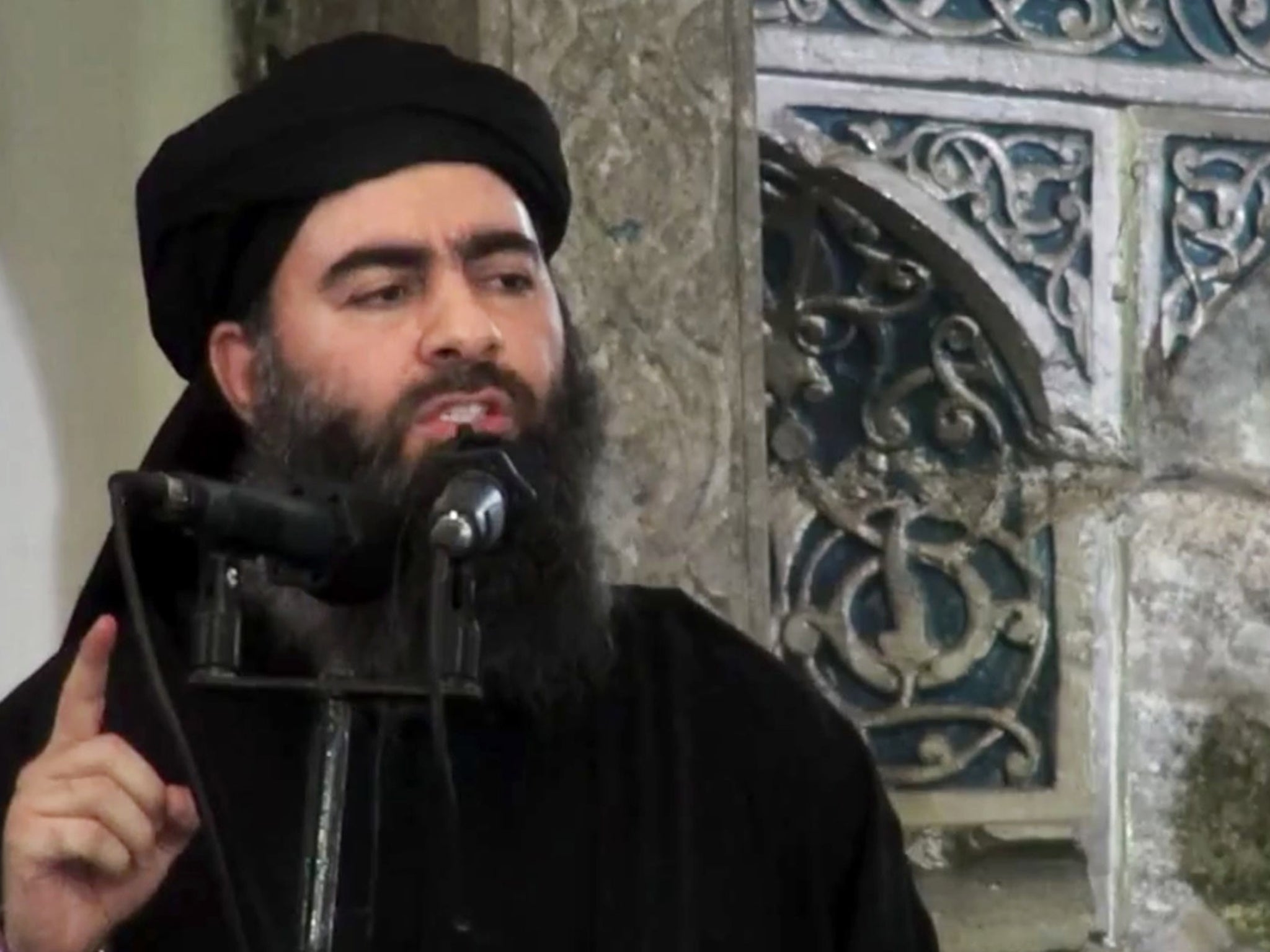Isis air strikes: Abu Bakr al-Baghdadi 'critically wounded' in air strikes near Mosul
Defence officials were unable to confirm local media reports that the Isis boss was among those hit

Your support helps us to tell the story
From reproductive rights to climate change to Big Tech, The Independent is on the ground when the story is developing. Whether it's investigating the financials of Elon Musk's pro-Trump PAC or producing our latest documentary, 'The A Word', which shines a light on the American women fighting for reproductive rights, we know how important it is to parse out the facts from the messaging.
At such a critical moment in US history, we need reporters on the ground. Your donation allows us to keep sending journalists to speak to both sides of the story.
The Independent is trusted by Americans across the entire political spectrum. And unlike many other quality news outlets, we choose not to lock Americans out of our reporting and analysis with paywalls. We believe quality journalism should be available to everyone, paid for by those who can afford it.
Your support makes all the difference.The US-led coalition against Isis has carried out a bomb attack on a convoy of senior militants that may have included the group's leader Abu Bakr al-Baghdadi.
American defence officials confirmed that the air strikes on Friday night destroyed 10 armoured vehicles near the northern Iraqi city of Mosul, and that the mission had been "against what was assessed to be a gathering of [Isis] leaders".
Iraqi state television and two officials also said yesterday that the Isis leader had been wounded.
An Interior Ministry official and a senior Iraqi military official both told the Associated Press that the strike on Saturday had wounded Baghdadi, but gave no details about how bad his injuries might be, following speculation about his death.
The death of the elusive leader would mark a significant step change in the US-led effort to curtail the Islamist extremist group.
Among those reportedly confirmed killed in the strikes was Abdul Rahman al-Athaee, also known as Abu Saja, one of al-Baghdadi's key aides and a man who regularly travelled with the militant group's self-proclaimed "caliph" or spiritual leader.
But while the Al Arabiya News Channel quoted local tribal sources as saying that al-Baghdadi was "critically wounded" in the attack, neither US nor Iraqi officials were able to provide further details.
Speaking to the BBC's Andrew Marr Show this morning, Chief of the Defence Staff General Sir Nicholas Houghton discussed al-Baghdadi's "potential death", suggesting the UK is confident there is at least a strong chance the Isis leader may have been successfully targeted.
Gen Houghton said he could not "absolutely confirm" that al-Baghdadi was in the convoy, but warned that the terror group's leadership would "regenerate" regardless of his fate.
"What I wouldn't want to do is rush to the sense that the potential death of one of their totemic leaders is going to create some strategic reverse in Isis," he said.
The Pentagon has released a statement saying that it "cannot confirm if [Isis] leader Abu Bakr al-Baghdadi was among those present", nonetheless adding that the strikes as a whole "demonstrate the pressure we continue to place on the IS terrorist network".
Meanwhile on Sunday it also emerged that Iraqi military forces had reached the centre of the northern city of Baiji, a major gain in the battle for the country's biggest oil refinery located nearby.
An Iraqi army colonel said government troops entered Isis-occupied Baiji, a city of about 200,000 people, from the south and west and took over the al-Tamim neighbourhood and city centre.
Speaking before those gains in a CBS "Face The Nation" interview broadcast today, Barack Obama hailed what he called the "very effective" air strikes carried out by the international coalition.
"The air strikes have been very effective in degrading ISIL's capabilities and slowing the advance that they were making," the US President said.
"Now what we need is ground troops, Iraqi ground troops, that can start pushing them back."
Obama announced on Friday that he had ordered the deployment of up to 1,500 more US soldiers to support Iraqi forces, which could bring the overall contribution of American troops in the country to 3,100.
Join our commenting forum
Join thought-provoking conversations, follow other Independent readers and see their replies
Comments